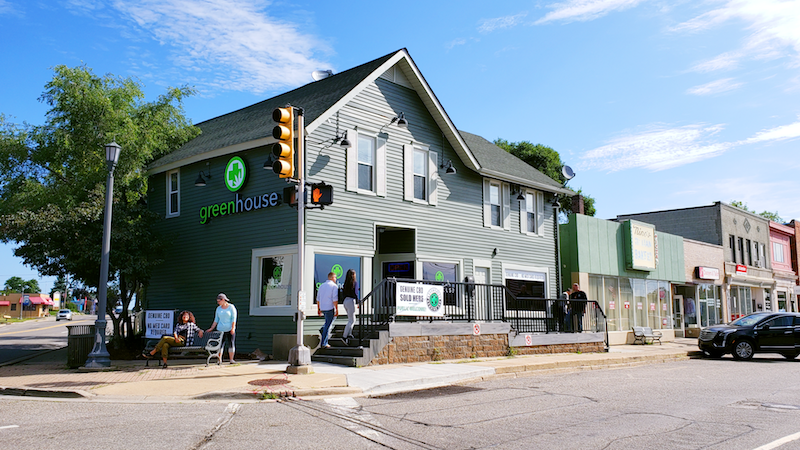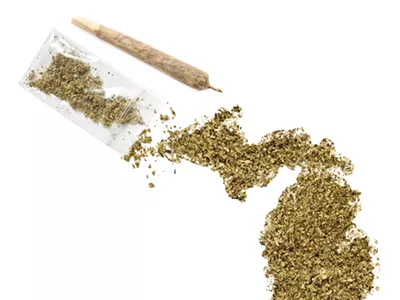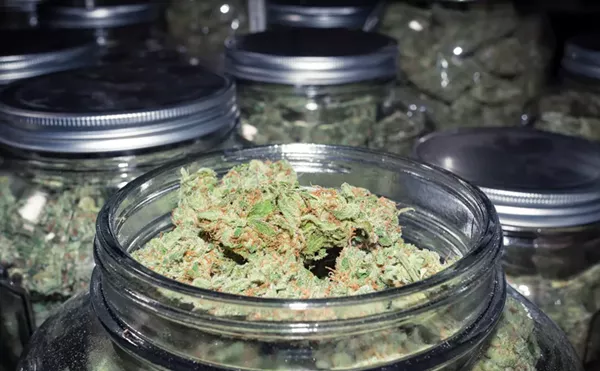
Audio By Carbonatix
[
{
"name": "GPT - Leaderboard - Inline - Content",
"component": "35519556",
"insertPoint": "5th",
"startingPoint": "3",
"requiredCountToDisplay": "3",
"maxInsertions": 100,
"adList": [
{
"adPreset": "LeaderboardInline"
}
]
}
]

Courtesy of The Greenhouse of Walled Lake
The Greenhouse of Walled Lake.
Though sales only started at the end of last year, Michigan's new recreational marijuana market is on track to surpass $1 billion, a milestone achieved by California in 2017.
Sloane Barbour, the chief revenue officer of cannabis industry recruitment agency FlowerHire, says that's thanks to Michigan's medical marijuana market, which voters approved in 2008. Michigan has the second-highest medical marijuana market in the country, behind California.
"It really is just explosive growth in Michigan," Barbour says. "There was already a robust medical market, in the sense that there was a community and sort of an expectation for a certain level of accessibility when it came to cannabis products. ... With the new recreational market, you already had a bit more of a normalization or social acceptance, if you will, of cannabis."
Barbour says despite the lead that other states like Vermont and Illinois had in legalizing recreational pot, Michigan could be the fastest-growing recreational market per capita outside of California. Both medical and recreational sales have continued to grow in Michigan in 2020, bringing in at least $313.7 million and $281.2 million, respectively, according to data from Headset Insights Pulse. Michigan's recreational marijuana sales has skyrocketed 566% between January 2020 and August 2020 from $9.8 million to $65.5 million. According to Headset Insights Pulses, Michigan stands out among other U.S. markets with the largest average basket sizes so far this year, at $84.59 per basket.
Barbour says according to his clients, Michigan's cannabis consumer base "is as diverse as it gets," he says. "You'll get a 21-year-old college kid out in Western Michigan who just graduated buying some joints for his friends, and then right after them have a 70-year-old senior who something that really helps with their arthritis."
It also doesn't hurt that though much of the rest of the economy shut down due to the coronavirus pandemic, Michigan's marijuana industry was considered "essential."
"With the pandemic where people are spending more time indoors without as much to do with a lot of anxiety, people will always self-medicate," Barbour says. "Traditionally that's been alcohol, and unfortunately it also can be things like opioids. But more and more we're seeing people turn to the cannabis plant, which is a healthier, safer alternative to sort of those other anti-anxiety medications.
Brad Rogers, CEO of cannabis company Red, White & Bloom, spent a decade in Canada's marijuana market, where he saw how popular attitudes about cannabis can change very quickly.
"It really took a little while for that to happen, but once it gets there, it just really takes off and people become very accepting of it," he says. "And when you look at the harm ratio from alcohol to cannabis, it's just doesn't even compare. Alcohol's had what I call a lock on the 'mind escape market' for the last 100 years. What's the other mind escape that you have, that's legal?"
Rogers says that the Michigan stores he's worked with have reported that Michigan customers tend to come in more frequently, "almost like buying a coffee every single day."
Detroit, the biggest city in the state, has yet to enter the recreational cannabis market, as City Council mulls over a social equity plan to help those harmed by the War on Drugs to enter the industry. That will boost Michigan's recreational market further. Rogers also thinks once the legal market is up and running will make it harder for the black market to do business.
"It's embryonic," he says. "We're watching prohibition end here."
We have a new events newsletter! Find out the best things to do in the area every Thursday in your inbox.






